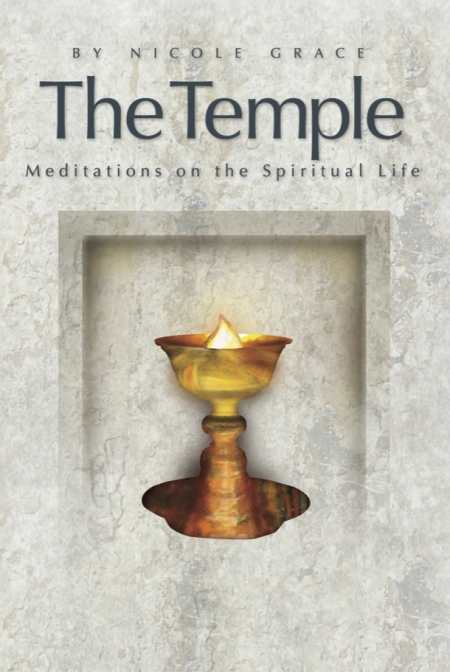
The Temple
Meditations on the Spiritual Life
Grace’s gift for using everyday situations to suggest universal truths creates poetry that is both artistically pleasing and spiritually inspiring.
The Temple: Meditations on the Spiritual Life is a collection of sensitive poems that merits the attention of those who seek greater spiritual understanding.
The author of three previous books, Nicole Grace offers a new volume of poems rich in meaning and written primarily in blank verse. Line breaks provide rhythmical separation of words, phrases, and sentences, with the first word of each new line usually capitalized. A Buddhist mystic, Grace delivers a spiritual message that is both inclusive and nonjudgmental, evidenced by the words she uses to denote a higher power, such as “Love,” “Divine,” “God,” and “Eternity.” The poems express insights gained through the author’s keen awareness of each passing moment. Her attention travels to birds soaring overhead, a night endured in a storm-tossed boat, private moments of self-doubt, and unexpected raindrops falling in the desert, among other topics.
“My Work” explains the poet’s reactions to critical performance ratings at work that leave her feeling inadequate. After reflection, she realizes that, instead of being hurt by unkind criticism, she can choose to believe in her unique suitability for the work she does. The poem concludes: “No one is better at being me / Than me.”
In “Head Banger,” a bird repeatedly hits its head against a wooden rail, as if putting on a show for her. This seemingly pointless behavior tells her that humans must also find ways to cope with life’s petty frustrations. Grace writes, “Ah teachers are patient and egoless. / They will be as ridiculous or as elegant as necessary / Until, through their cunning theatrics, / We finally grasp the Truth.”
The poem “Fire” hides deeper meaning beneath mundane experience. After an exhausting day far from home, the author retreats to her hotel room to find the television playing a video of a hearth fire. She remembers the fireplace awaiting her return home, when she will take comfort in lighting a real fire. Had she never experienced a true fire, she wonders if she would have recognized the unreality of the TV fire. The poem ends with: “What else in this world of / Color and chaos I might / Assume is / Real / That is / in fact / Not.”
Grace’s gift for using everyday situations to suggest universal truths creates poetry that is both artistically pleasing and spiritually inspiring. Her use of blank verse provides greater freedom of expression and structure. For instance, the poem “Astronaut” begins with a premise that asks readers to consider choices a, b, c, or d. Answers to these four choices are explained, and then a fifth, more spiritually advanced option is explored. The poems vary in length; some are four to six pages long, while several consist of just a few words.
On the surface, these poems seem simple in meaning, but additional readings reveal more nuanced interpretations. The Temple offers readers poems of lasting, contemplative guidance.
Reviewed by
Margaret Cullison
Disclosure: This article is not an endorsement, but a review. The publisher of this book provided free copies of the book and paid a small fee to have their book reviewed by a professional reviewer. Foreword Reviews and Clarion Reviews make no guarantee that the publisher will receive a positive review. Foreword Magazine, Inc. is disclosing this in accordance with the Federal Trade Commission’s 16 CFR, Part 255.
